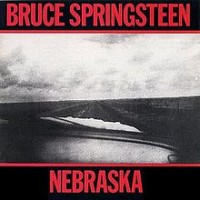Bruce Springsteen's Nebraska will probably never be as big as Born to Run, but its influence on indie music has been huge over the last 30 years. It began life as a demo collection of songs for the next E Street Band album. But practices yielded versions that lacked the demos' haunting, sparse quality. Eventually, Springsteen opted to just release the songs as they were, minus "Born in the U.S.A." The resulting record took elements that had been present in Bruce's work since at least Born to Run--the darker failings of America--and pushed them to the forefront.
The songs have various energies, but they're all just different kinds of desperate. "Atlantic City" is the closest thing to a rocker, a strummed out ode to a failing romance. "Highway Patrolman," "Johnny 99" and "State Trooper" form a trilogy of bad dealings with the law. Familial strains come up as well, again on "Highway Patrolman," as well as "Used Cars" and "My Father's House." The closest thing to uplift comes on the concluding track, "Reason to Believe." Over a bluesy riff, Springsteen is confronted with a litany of disturbing images and realizes that faith is meant to placate ("At the end of every hard-earned day / People find some reason to believe"). It's a stark conclusion to a stark record. Yet as depressing as the songs get, the hooks are surprisingly strong too, as evidenced by "Atlantic City" and "Reason to Believe."
Nebraska gets by on minimalism, something Springsteen still isn't known for, and good lyrics. Most of Bruce's albums were homages to his favorite styles. With Nebraska, he invented one of his own, lo-fi. Lo-fi is marked by low fidelity recording quality, which lends songs a hazy atmosphere. It forces listeners to imagine more about what's going on, creating sounds that aren't there. It's like keeping a monster in the darkness: More effective. Born to Run is stuffed with instrumentation, but it's the same listen every time. Nebraska constantly shifts its shape, lending already amazing songs like "Atlantic City" and "Johnny 99" an extra enticing quality.
By utilizing lower fidelity, artists can create a haze for listeners to get lost in. Monster movies are more effective when the creature is hidden, a la Jaws or The Thing, and the same could be said of lo-fi. The tones implied are just as important as the ones heard. Springsteen has tried a few times to recreate Nebraska's indie-folk, with mixed results on The Ghost of Tom Joad and Devils & Dust, but it truly is a one-of-a-kind record in his discography.
